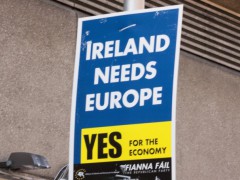The Future of Europe: Growth and Enlargement

This post was produced for the Global Economic Symposium 2013 to accompany a session on “The Future of Europe.” Read more at http://blog.global-economic-symposium.org/.
The European Union has managed to bring stability to a problematic area of the world, and it did that through the magic of economics. Now, as the old continent faces several financial crises and European solidarity is waning, it needs to undergo one more great transformation. In order for the EU to flourish, it needs to leave behind its transnational, confederal past and accept two very important principles as core values: federalism and the free market.

Now more than ever, Ireland and the rest of the Member States need Europe . . . to change. Photo by William Murphy on Flickr, CC BY-SA 2.0.
The EU apparatus has become (or at least seems) huge and bloated, a testament to that old adage “the bureaucracy is expanding to meet the needs of the expanding bureaucracy.” Between the Commission’s massive cadres both at home and abroad and the staff of the MEPs, who are also already a prodigious number on their own, the European Union’s civil servants and staffers are oftentimes an image burden for the organization as well as a financial drain. But while anti-European politicians rail against the “wasteful bureaucracy,” there are far greater structural problems with the EU Budget, such as the oft-neglected CAP and long-overdue legal reforms.
There are of course parties that have been saying this for quite a while, but the so-called euroskeptics hardly have the EU’s best interest at heart. Instead, the reform-minded blocs are usually purveyors of nationalist and anti-EU agendas. Meanwhile, things in dire need of reform remain unchanged or deadlocked because of the national political interests of big bloc members such as the EPP and S&D.
What the EU really needs is a party or group willing to pursue two different agendas: creating long-term, sustainable economic growth through minimal interventionist policies while at the same time furthering and consolidating the EU enlargement. In short, the Union needs leadership that is willing to pursue an unpopular federalist agenda and balance it out with free market measures and small-state reforms that create growth. The EU needs to turn from a hybrid confederal-international organization into a lean, mean federal democracy.
Of course, this approach may seem antithetical at first as, after all, small government is not often very compatible with consolidation and federalization. And laissez-faire liberals will argue that centralization and government oversight work poorly with free market reforms. Let’s not even mention the fact that the EU is increasingly unpopular throughout Europe and that it is highly unlikely for a party or faction to take up the banner of EU consolidation and further expansion.
And yet a small but competent central EU apparatus with a cohesive and sensible Europe-wide financial policy, an agenda for further expansion, and a financial policy that is fundamentally free market (with tax cuts and anti-protectionist measures at the very least) could restore growth and stability to the EU. This, however, must not be done at the expense of democracy. While the EU needs a leaner parliament, it also needs more cross-border representation.
Obviously, this would mean that long-time staples of European politics, such as the hallowed welfare state and farming subsidies, would have to be reexamined; it would also mean Thatcherian (though, hopefully more elegant) reforms at all levels and a slight general shift towards the right. It is interesting to note that the strongest current EU candidates, Iceland and Turkey, have both veered towards the right in the past few years — in Turkey’s unfortunate case, on the social as well as the economic front.
European politics being what they are, it is unlikely that we’ll see any such political movement anytime soon. But with a growing number of fiscally-conservative yet pro-EU young voters throughout the western European nations, we might see the seeds of a pro-EU, pro-market movement in the near future. Until then, it’s business as usual.
